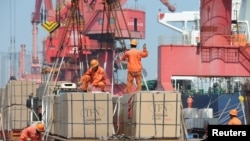ທ່າມກາງຄວາມເປັນຫ່ວງທີ່ສົງຄາມການຄ້າກັບຈີນເພີ້ມທະວີຄວາມຮ້າຍແຮງຂຶ້ນ ດັດ
ຊະນີຮຸ້ນອາເມຣິກັນ ທີ່ສຳຄັນທັງສອງ ໄດ້ມີຄ່າຫຼຸດລົງໃນວັນສຸກວານນີ້ ຊຶ່ງເປັນການ
ຕົກລາຄາທີ່ໃຫຍ່ທີ່ສຸດ ປະຈຳອາທິດ ໃນປີນີ້.
ດັດຊະນີຮຸ້ນ S&P 500 ແລະຮຸ້ນ Nasdaq ໄດ້ຕົກລາຄາ 3.1 ເປີເຊັນແລະ 3.9
ເປີເຊັນ ຕາມລຳດັບ ໃນອາທິດນີ້ ໃນຂະນະທີ່ຮຸ້ນ Dow Jones ໄດ້ຕົກລາຄາຮ້າຍ
ແຮງສຸດເປັນອາທິດທີສອງໃນປີນີ້ ໂດຍມີຄ່າຫລຸດລົງ 2.6 ເປີເຊັນ.
ການປະກາດທີ່ບໍ່ຄາດຄິດຂອງປະທານາທິບໍດີດໍໂນລ ທຣຳ ໃນມື້ກ່ອນນັ້ນ ທີ່ຈະເກັບ
ພາສີຕື່ມ 10 ເປີເຊັນ ຕໍ່ຜະລິດຕະພັນຈີນທີ່ຍັງເຫຼືອຢູ່ໃນມູນຄ່າ 300 ພັນລ້ານໂດລາ
ຊຶ່ງໄດ້ກໍ່ໃຫ້ເກີດຄວາມບໍ່ແນ່ນອນ ແລະຄວາມຢ້ານກົວໃນໝູ່ບັນດາຜູ້ລົງທຶນ.
ພວກເຈົ້າໜ້າທີ່ລັດຖະບານປະທານາທິບໍດີທຣໍາ ກ່າວວ່າ ຕະຫຼາດສະແດງການ ຕື່ນ
ຕົກໃຈເກີນໄປ ໂດຍຢືນຢັດວ່າ ບັນດາຜູ້ບໍລິໂພກອາເມຣິກັນ ຈະບໍ່ຮູ້ສຶກໃນ ເກັບພາສີ
ສູງຂຶ້ນນີ້ແຕ່ຢ່າງໃດ.
ຫົວໜ້າຫ້ອງການສະພາເສດຖະກິດແຫ່ງຊາດ ທ່ານແລຣີ ຄັດໂລ ກ່າວຕໍ່ບັນດານັກ
ຂ່າວໃນວັນສຸກວານນີ້ ໃນການຕອບຄຳຖາມຈາກ ວີໂອເອ ວ່າ “ການແບກຫາບທາງ
ເສດຖະກິດ ສ່ວນໃຫຍ່ແລ້ວຈະຕົກເປັນຂອງຝ່າຍ. ເຂົາເຈົ້າໄດ້ຫຼຸດລາຄາເພື່ອພະຍາ
ຍາມແຂ່ງຂັນ ຊຶ່ງນັ້ນໄດ້ສ້າງຄວາມເສຍຫາຍຕໍ່ຜົນກຳໄລຂອງເຂົາເຈົ້າ ຕໍ່ບໍລິສັດ ແລະ
ຕໍ່ເສດຖະກິດຂອງເຂົາເຈົ້າ.”
ພວກນັກເສດຖະສາດທຳນາຍວ່າ ບັນດາຜູ້ບໍລິໂພກ ໃນສະຫະລັດ ຈະພົບເຫັນ ວ່າ
ເຂົາເຈົ້າຈະຊື້ສິ່ງຂອງຕ່າງໆໃນລາຄາທີ່ແພງຂຶ້ນເຊັ່ນໂທລະສັບມືຖື ເຄື່ອງນຸ່ງ ແລະ
ເຄື່ອງຫຼີ້ນ ເວລາໄປຊື້ຂອງຂວັນວັນບຸນຄຣິສມັສ ແລະວັນພັກບຸນອື່ນໆ.
ວີໂອເອ ໄດ້ຖາມປະທານາທິບໍດີທຣຳ ໃນຕອນບ່າຍວັນສຸກວານນີ້ວ່າ ທ່ານສາມາດ
ໃຫ້ການຄ້ຳປະກັນແກ່ຊາວອາເມຣິກັນໄດ້ຫຼືບໍ່ ວ່າເຂົາເຈົ້າຈະບໍ່ຊື້ຂອງຂວັນເຫລົ່ານັ້ນ
ໃນລາຄາທີ່ແພງຂຶ້ນ ເນື່ອງຈາກການເກັບພາສີໃໝ່.
ປະທານາທິບໍດີຕອບວ່າ “ເງິນຕາຂອງຈີນກຳລັງໄປໝໍ້ນະລົກ” ແຕ່ເຂົາເຈົ້າຍັງທຸ້ມເທ
ເງິນເຂົ້າ ແລະນັ້ນຈະນຳໄປຈ່າຍຄ່າເກັບພາສີທັງໝົດ. ການເກັບພາສີບໍ່ໄດ້ຈ່າຍໂດຍ
ປະຊາຊົນຂອງພວກເຮົາ. ແຕ່ຈະຖືກຈ່າຍໂດຍຈີນ.
Amid worries of an escalating trade war with China, two key American stock indexes fell on Friday, posting their biggest weekly drops of the year
The S&P 500 and Nasdaq lost 3.1 percent and 3.9 percent, respectively, this week, while the Dow Jones Industrial Average had its second-worst week of the year, slipping 2.6 percent.
President Donald Trump's surprise announcement the previous day to impose 10 percent tariffs on the remaining $300 billion worth of Chinese products triggered uncertainty and fearamong investors.
Trump administration officials contend markets are overreacting, insisting American consumers will not feel the pain of the higher tariffs.
"Economic burdens have fallen most heavily on China," National Economic Council Director Larry Kudlow told reporters on Friday, in response to a question from VOA. "They've had to slash prices to try to compete. That has done damage to their profits, their companies and their economy."
Economists predict U.S. consumers will find themselves paying more for such items as cellphones, clothing and toys when shopping for Christmas and other holidays.
VOA asked Trump on Friday afternoon if he could assure Americans that they will not be paying more for those presents due to the new tariffs.
China's "currency is going to hell, but they're also pouring money in and that will totally pay for the tariffs," the president replied. "The tariffs are not being paid for by our people. It's being paid for by China."





